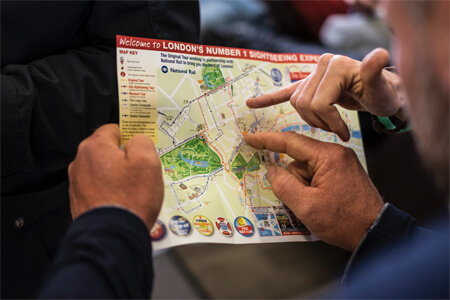
Recently we have been receiving a lot of requests from small to medium sized businesses on how they can rank better within localised results in the search engines. Google Places has somewhat revolutionised the ability to have websites appear in localised results for many businesses, increasing their foot traffic as well as online sales with customers preferring to make a purchase of a good or service from a local business. Any business of any size can benefit from search engine optimization (SEO). Geo-specific optimisation in particular can make a small investment go a long way, as well as ensuring more relevant people click through into your website.
For example, “driving instructor in London” or “office space in Cambridge” will be less competitive than simply “driving instructor” or “office space to rent”. If you provide services to a specific area, then read on for our top 10 tips for localised SEO.
1. Get Involved with Your Local Online Community
A great place to start is with local websites, forums and other social communities. Get involved by getting your business participating on them. If, for example, you are a local plumber or gas engineer, there will almost certainly be a forum where people are asking for advice on their boilers and central heating. Help people out by answering their questions and assisting them. You will start to build a good reputation within the community fairly quickly. It will help even more if you are able to include links to your website but be careful as you don't want to be tagged as a spammer!
2. Get Your Business on Google Places
Getting listed on Google Places is a relatively easy process and one we can help with if required. This lets people searching on both Google and Google Maps see localised results and details of you business. Your address, telephone number, website URL as well as customer reviews can all be made available and visible. A focus on good customer service (which all companies should be aiming for) will help encourage positive reviews and in turn, will increase the likelihood of conversions.
As it is with Google's regular results and rankings, it can be difficult to rank well, especially if there are hundreds of other local businesses who all want to rank well for 'driving instructors in London' or 'washing machine repairs in Oxford'. Always check that the information matches with what is on your website and try to encourage satisfied customers to leave positive reviews so Google knows that what it is offering in the results is useful for people searching.
3. Update Your Domain's WHOIS Information
Many SEO experts believe that Google takes into account the information that is registered against a domain name. It wouldn't hurt to check that the information matches your current business address as it's a fairly easy exercise. You can use a WHOIS checker online to see just what information is registered and then log in to your domain registrar and change the information if necessary.
4. Get Involved with Your Local Offline Community
Point 1 above was recommending getting involved in local online communities but getting your business active in your local area also has its benefits. Actively participating in local community campaigns, sponsorships, local charities and other local activities can give local businesses additional PR which often results in other local websites mentioning your business. All these links and mentions further help highlight your relevance to the local area.
5. It's not just About Google
Google may dominate the search market and disregarding alternative channels may mean that you are losing out on additional traffic and sales.
Yahoo Local and Bing Maps also have their own versions with almost 30% market share between them, could mean you are losing out if you are not using them. Spending a bit of time and including your company profile on these, as well as other localised business directories may be beneficial in giving your business some additional coverage.
6. Reviews, Reviews and More Reviews
Everyone searching the web, whether for a product or service will most likely try to look at reviews to determine which company to use. Aside from the many review websites out on the web, Google Places also provides customer reviews and rating within the search results.
Positive reviews against your company's listing can have a positive impact on click through rates, driving more traffic to your site. Actively encouraging satisfied customers to leave a positive review can make a world of difference to your business.
7. Consider Using Geographical Top Level Domains
If your business heavily depends on ranking well in local web searches, consider using a local geographic top level domain (TLD), such as .co.uk, for your main website. Most search engines will try to determine relevance to a particular country by checking the TLD. If you already have a generic domain such as .com, you can set your target country location using Google's webmaster tools, Bing also has a similar feature within their console.
There are SEO related pros and cons in using geographic TLD's, sub-domains or sub-folders on your website so it would be wise to research each, especially if you already have a well ranked web presence that you wouldn't want to disrupt. Duplicate content may also be an issue and needs to be thought about before making any changes.
8. Spread Your Web Presence
Although Google may be the first place most people look for a local service, however, you shouldn't neglect other localised web services.
Don't forget that other services will also be listed within the search results and some people will also go directly to these rather than direct to Google. Yell.com, ThomsonLocal and Qype, to name but a few, also provide local listings and results and it is important to have a full profile on as many of these as possible. Most offer a free basic listing and in most cases this would be sufficient.
9. Mention Your Locale Throughout Your Website
If you rely on local business then make sure your locality is mentioned within your web copy as well as ensuring that it is prominent enough for both visitors to identify as well as the search bots. Mentioning your location throughout your web pages will signify to search engines that your business, service(s) & product(s) are relevant to specific locales or a region helping your website to rank higher within results.
10. Go National!
Many businesses are able to provide their products and services nationally. It can be tricky to get the balance right however you wouldn't want to just restrict your online presence to just your local area. Stating that you also provide your goods and service on a national basis will help, ensuring that customers are not put off.
About the Author
Tom has been in the Digital Marketing industry for over 15 years. He has been a consultant for some major brands such as Tesco, Audi, TUI, First Choice & Barclays. Tom also hosts workshops and seminars on Digital Marketing.








